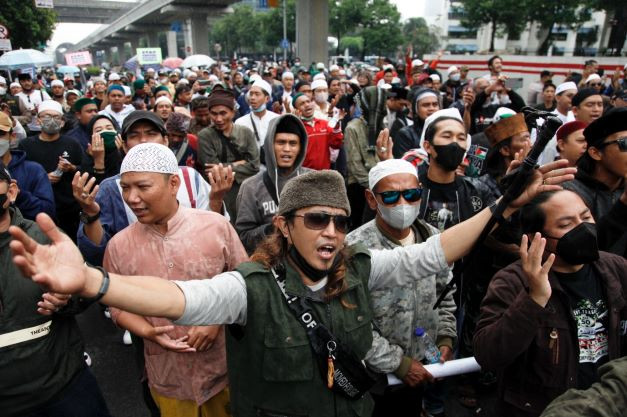Politics of bigotry
Indonesia is also facing its own demons when it comes to identity politics, as our very own politicians pander to fringe Islamist groups for electoral gains.
Change Size

I
t is disheartening to see the downward spiral of religious pluralism in India after the Bharatiya Janata Party (BJP), a Hindu nationalist party, took power in 2014.
The party was under fire after two of its spokespeople made derogatory remarks about Prophet Muhammad, triggering diplomatic backlashes from Muslim-majority countries, including Indonesia. The BJP, which claims to respect “all religions”, has expelled one of them and suspended the other, in a clear attempt at controlling the damage.
The BJP’s claim, however, should be taken with a grain of salt, for it is hard to ignore the links between the growing anti-Muslim sentiment in India and the right-wing extremism of the Hindutva ideology embraced by the BJP.
It should be noted that the protests lodged by foreign diplomats over the insulting remarks about the Prophet -- including Foreign Minister Retno LP Marsudi -- belie the grave situation facing Indian Muslims under the Narendra Modi government.
In recent months, reports have emerged of increasing persecution against the country’s largest minority group. The Indian authorities, for example, have been accused of demolishing the homes and businesses belonging to Muslims accused of taking part in sectarian conflicts between Muslims and Hindus or organizing protests against the government. In the southern state of Karnataka, Indian Muslim women are banned from wearing hijab in classes, a policy endorsed by the state’s high court.
India, sadly, is not an outlier in its descent into political sectarianism and tribalism, which is emblematic of the global democratic regression. In the United States, the world’s largest democracy, a teenage gunman killed ten black people after posting a political manifesto outlining the “great replacement” of white people by non-whites, a conspiracy theory peddled by right-wing politicians and media commentators.
Indonesia is also facing its own demons when it comes to identity politics, as our very own politicians pander to fringe Islamist groups for electoral gains, turning their divisive, if not violent, rhetoric into the political norm. Identity politics was all that mattered in the previous presidential elections, and this trend may not change in 2024.
To prevent the weaponization of identity politics, we need to understand its origin, and how it came to be in any society. Is ideology the only factor? Or are there any structural causes that push certain social forces into political sectarianism and tribalism?
It bears emphasis that identity politics is a contentious concept. The US left, for instance, has relied on identity politics to fight against systemic racism in the country. For them, it is all about inclusion and recognition, not division. In Indonesia, the first anti-colonial political organizations had been largely tribal and sectarian before we came to a decision that the new state must transcend religious, ethnic and racial barriers.
We can all agree, however, that identity politics is a threat when it becomes the politics of bigotry, the politics of division. This is when the political elite stoke fears among one group to exclude and demonize another in a quest for political power.
The consequence of such politics could be dire -- we have seen it in our country, and we are now seeing its worst manifestations in the world’s largest democracies.









